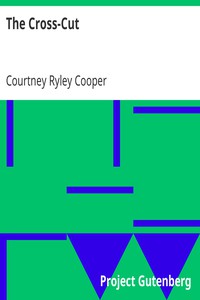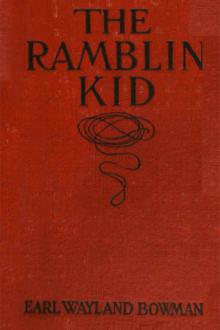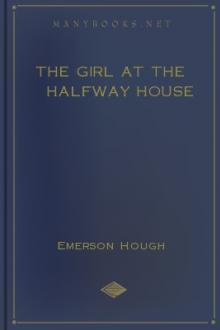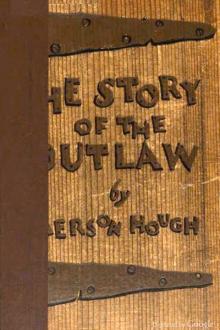The Cross-Cut, Courtney Ryley Cooper [best ereader for manga txt] 📗

- Author: Courtney Ryley Cooper
Book online «The Cross-Cut, Courtney Ryley Cooper [best ereader for manga txt] 📗». Author Courtney Ryley Cooper
"We 're going to 'ave a look at it."
"A look? What good would it—?"
"A cat can look at a king," said Harry. "They can't arrest us for going up there like everybody else."
"But to go there and ask them to look at their riches—"
"There ain't no law against it!"
He reached for his carbide lamp, hooked to a small chink of the hanging wall, and then pulled his hat over his bulging forehead. Carefully he attempted to smooth his straying mustache, and failing, as always, gave up the job.
"I 'd be 'appy, just to look at it," he announced. "Come on. Let's forget 'oo they are and just be lookers-on."
Fairchild agreed against his will. Out of the shaft they went and on up the hill to where the townspeople again were gathering about the opening of the Silver Queen. A few were going in. Fairchild and 'Arry joined them.
A long walk, stooping most of the way, as the progress was made through the narrow, low-roofed tunnel; then a slight raise which traveled for a fair distance at an easy grade—at last to stop; and there before them, jammed between the rock, was the strike, a great, heavy streaking vein, nearly six feet wide, in which the ore stuck forth in tremendous chunks, embedded in a black background. Harry eyed it studiously.
"You can see the silver sticking out!" he announced at last. "It's wonderful—even if the Rodaines did do it."
A form brushed past them, Blindeye Bozeman, returning from the celebration. Picking up a drill, he studied it with care, finally to lay it aside and reach for a gad, a sort of sharp, pointed prod, with which to tear away the loose matter that he might prepare the way for the biting drive of the drill beneath the five-pound hammer, or single jack. His weak, watery eyes centered on Harry, and he grinned.
"Didn't believe it, huh?" came his query.
Harry pawed his mustache.
"I believed it, all right, but anybody likes to look at the United States Mint!"
"You 've said it. She 's going to be more than that when we get a few portable air compressors in here and start at this thing in earnest with pneumatic drills. What's more, the old man has declared Taylor Bill and me in on it—for a ten per cent. bonus. How's that sound to you?"
"Like 'eaven," answered Harry truthfully. "Come on, Boy, let's us get out of 'ere. I 'll be getting the blind staggers if I stay much longer."
Fairchild accompanied him wordlessly. It was as though Fate had played a deliberate trick, that it might laugh at him. And as he walked along, he wondered more than ever about the mysterious telegram and the mysterious conversation of the greasy Barnham in Denver. That—as he saw it now—had been only an attempt at another trick. Suppose that he had accepted; suppose that he had signified his willingness to sell his mine and accept the good offices of the "secret friend" to end his difficulties. What would have been the result?
For once a ray of cheer came to him. The Rodaines had known of this strike long before he ever went to that office in Denver. They had waited long enough to have their assays made and had completed their first shipment to the smelter. There was no necessity that they buy the Blue Poppy mine. Therefore, was it simply another trick to break him, to lead him up to a point of high expectations, then, with a laugh at his disappointment, throw him down again? His shoulders straightened as they reached the outside air, and he moved close to Harry as he told him his conjectures. The Cornishman bobbed his head.
"I never thought of it that way!" he agreed. "But it could explain a lot of things. They 're working on our—what-you-call-it?"
"Psychological resistance."
"That's it. Psych—that's it. They want to beat us and they don't care 'ow. It 'urts a person to be disappointed. That's it. I alwyes said you 'ad a good 'ead on you! That's it. Let's go back to the Blue Poppy."
Back they went, once more to descend the shaft, once more to follow the trail along the drift toward the opening of the stope. And there, where loose earth covered the place where a skeleton once had rested, Fairchild took off his coat and rolled up his sleeves.
"Harry," he said, with a new determination, "this vein does n't look like much, and the mine looks worse. From the viewpoint we 've got now of the Rodaine plans, there may not be a cent in it. But if you're game, I'm game, and we'll work the thing until it breaks us."
"You 've said it. If we 'it anything, fine and well—if we can turn out five thousand dollars' worth of stuff before the trial comes up, then we can sell hit under the direction of the court, turn over that money for a cash bond, and get the deeds back. If we can't, and if the mine peters out, then we ain't lost anything but a lot of 'opes and time. But 'ere goes. We 'll double-jack. I 've got a big 'ammer 'ere. You 'old the drill for awhile and turn it, while I sling th' sledge. Then you take th' 'ammer and Lor' 'ave mercy on my 'ands if you miss."
Fairchild obeyed. They began the drilling of the first indentation into the six-inch vein which lay before them. Hour after hour they worked, changing positions, sending hole after hole into the narrow discoloration which showed their only prospect of returns for the investments which they had put into the mine. Then, as the afternoon grew late, Harry disappeared far down the drift to return with a handful of greasy, candle-like things, wrapped in waxed paper.
"I knew that dynamite of yours could n't be shipped in time, so I bought a little up 'ere," he explained, as he cut one of the sticks in two with a pocketknife and laid the pieces to one side. Then out came a coil of fuse, to be cut to its regular lengths and inserted in the copper-covered caps of fulminate of mercury, Harry showing his contempt for the dangerous things by crimping them about the fuse with his teeth, while Fairchild, sitting on a small pile of muck near by, begged for caution. But Harry only grinned behind his big mustache and went on.
Out came his pocketknife again as he slit the waxed paper of the gelatinous sticks, then inserted the cap in the dynamite. One after another the charges were shoved into the holes, Harry tamping them into place with a steel rod, instead of with the usual wooden affair, his mustache brushing his shoulder as he turned to explain the virtues of dynamite when handled by an expert.
"It's all in the wye you do it," he announced. "If you don't strike fire with a steel rod, it's fine."
"But if you do?"
"Oh, then!" Harry laughed. "Then it's flowers and a funeral—after they 've finished picking you up."
One after another he pressed the dynamite charges tight into the drill holes and tamped them with muck wrapped in a newspaper that he dragged from his hip pocket. Then he lit the fuses from his lamp and stood a second in assurance that they all were spluttering.
"Now we run!" he announced, and they hurried, side by side, down the drift tunnel until they reached the shaft. "Far enough," said Harry.
A long moment of waiting. Then the earth quivered and a muffled, booming roar came from the distance. Harry stared at his carbide lamp.
"One," he announced. Then, "Two."
Three, four and five followed, all counted seriously, carefully by Harry. Finally they turned back along the drift toward the stope, the acrid odor of dynamite smoke-cutting at their nostrils as they approached the spot where the explosions had occurred. There Harry stood in silent contemplation for a long time, holding his carbide over the pile of ore that had been torn from the vein above.
"It ain't much," came at last. "Not more 'n 'arf a ton. We won't get rich at that rate. And besides—" he looked upward—"we ain't even going to be getting that pretty soon. It's pinching out."
Fairchild followed his gaze, to see in the torn rock above him only a narrow streak now, fully an inch and a half narrower than the vein had been before the powder holes had been drilled. It could mean only one thing: that the bet had been played and lost, that the vein had been one of those freak affairs that start out with much promise, seem to give hope of eternal riches, and then gradually dwindle to nothing. Harry shook his head.
"It won't last."
"Not more than two or three more shots," Fairchild agreed.
"You can't tell about that. It may run that way all through the mountain—but what's a four-inch vein? You can go up 'ere in the Argonaut tunnel and find 'arf a dozen of them things that they don't even take the trouble to mine. That is, unless they run 'igh in silver—" he picked up a chunk of the ore from the muck pile where it had been deposited and studied it intently—"but I don't see any pure silver sticking out in this stuff."
"But it must be here somewhere. I don't know anything about mining—but don't veins sometimes pinch off and then show up later on?"
"Sure they do—sometimes. But it's a gamble."
"That's all we 've had from the beginning, Harry."
"And it's about all we 're going to 'ave any time unless something bobs up sudden like."
Then, by common consent, they laid away their working clothes and left the mine, to wander dejectedly down the gulch and to the boarding house. After dinner they chatted a moment with Mother Howard, neglecting to tell her, however, of the downfall of their hopes, then went upstairs, each to his room. An hour later Harry knocked at Fairchild's door, and entered, the evening paper in his hand.
"'Ere 's something more that's nice," he announced, pointing to an item on the front page. It was the announcement that a general grand jury was to be convened late in the summer and that one of its tasks probably would be to seek to unravel the mystery of the murder of Sissie Larsen!
Fairchild read it with morbidity. Trouble seemed to have become more than occasional, and further than that, it appeared to descend upon him at just the times when he could least resist it. He made no comment; there was little that he could say. Again he read the item and again, finally to turn the page and breathe sharply. Before him was a six-column advertisement, announcing the strike in the Silver Queen mine and also spreading the word that a two-million-dollar company would be formed, one million in stock to represent the mine itself, the other to be subscribed to exploit this new find as it should be exploited. Glowing words told of the possibilities of the Silver Queen, the assayer's report was reproduced on a special cut which evidently had been made in Denver and sent to Ohadi by rush delivery. Offices had been opened; everything had been planned in advance and the advertisement written before the town was aware of the big discovery up Kentucky Gulch. All of it Fairchild read with a feeling he could not down,—a feeling that Fate, somehow, was dealing the cards from the bottom, and that trickery and treachery and a venomous nature were the necessary ingredients, after all, to success. The advertisement seemed to sneer at him, to jibe at him, calling as it did for every upstanding citizen of Ohadi to join in on the stock-buying bonanza that would make the Silver Queen one of the biggest mines in the district and Ohadi the big silver center of Colorado. The words appeared to be just so many daggers thrust into his very vitals. But Fairchild read them all, in spite of the pain they caused. He finished the last line, looked at the list of officers, and gasped.
For there, following one another, were three names, two of which Fairchild had expected. But the other—
They were, president and general manager, R. B. (Squint) Rodaine; secretary-treasurer, Maurice Rodaine; and first vice-president—Miss Anita Natalie Richmond!
CHAPTER XVIII
After that, Fairchild heard little





Comments (0)